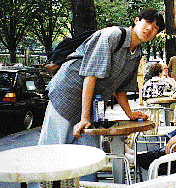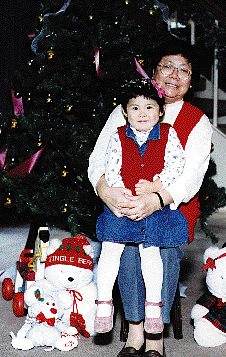GOLDSEA | ASIAMS.NET | ASIAN AMERICAN PERSONALITIES
DR DNA
PAGE 7 of 7
Fong likes to cite a bit of CEO wisdom picked up from Tom Cory who heads a billion-dollar chemical company.
"I asked Tom, 'How can you manage this billion dollar company?' He said, 'I only work five days a week. One trick, I always put my nose in but I keep my fingers out.' I think that's pretty much what I'm doing."
| "I would like to have the technology to change the paradigm of what we are doing." |
"I go out with my kids," he says. Son Jon is now 15 and daughter Maggie is 3 1/2. They live in a spacious four-bedroom home in Los Altos Hills.
"It's a regular house, not that much a fancy house. It's a good house, we enjoy it. I am not extravagant. I can live in a much bigger house but I don't pay much attention to this kind of thing. Once in a while, I like to play golf. I would love to golf more if I had more time. I have a sense of duty [to Clontech] so I leave my family behind and do not do that kind of thing as much as I would like to."
In addition to 43 PdD scientists and additional lab technicians, Clontech employs 30 in sales and marketing, 20 in finance, 16 in shipping and receiving, 30 in production. Its German subsidiary employs 10, all in sales and marketing. At the moment another subsidiary is being established in the UK. Fong feels he and Clontech are now ready to create a management team to free him from day-to-day operations.
"My challenge is really how I can cultivate our senior people to run this company independently of me. Then I can have more time to do more business development and other things I enjoy doing. I might do a little more traveling, do more things with other companies."
A few years ago Fong started a second company in Palo Alto which specializes in diagnostics. IgenX now employs 15 and is modestly profitable but so far seems to have been a disappointment for Fong who's accustomed to 35% annual growth.
Fong recognizes the need to diversify Clontech's business to ensure continued growth and profitability, and that this means becoming a leader in biochips
"I would like to have the technology that would change the paradigm [of what we are doing] so people will follow. I would like to have something like Netscape, a phenomenon that changes the way we [use the internet]."
If Clontech succeeds in translating its proven expertise in molecular biology research tools into biochips ahead of its competitors, it would greatly expand its business universe. Currently it prints and mails 100,000 copies of its 250-page catalogs--half to researchers in the U.S. and half to those in Japan and Europe. Biochips would take sophisticated gene-based diagnostics down to practically every medical lab in the world and, ultimately, even to individual consumers, thereby expanding Clontech's customer base into the millions.
To do so Clontech must recruit more scientists and technologists by the dozens. Fong recognized the need years ago and has cultivated a management style that has shown success in hanging onto valued employees.


Son John, 15, and wife Pam with daughter Maggie, 3 1/2.
"I have been able to keep my scientists here very well," he says. "I came from science. To [have them] do the kind of thing they enjoy doing, you have to let them alone to do it. You have to know how to support them so they're able to succeed in the area they're good at. My senior VPs and other officers know how to leave them alone." He also employs a two-tiered incentive system that awards semi-annual bonuses based on individual performance augmented by a profit-sharing plan.
At the moment about 30% of Clontech's scientists are Asian, mostly from China. "There are a lot of Asians in research," Fong says. "[Back in the 60s] they were mostly from Hong Kong. Then in the 70s and early 80s they came from China and Corea and some from Japan. But the Japanese always go back to Japan. Then they were from Corea and Taiwan. Right now they're mostly from China, probably because of China's open-door policy. A lot of youngsters came here to study, and they want to find a job."
At the moment Clontech recruits its researchers from among post-docs at universities like Stanford, Berkeley, UCLA and the East Coast. Recruits who earned $30,000-$40,000 a year at universities can enjoy a raise to $60,000 plus bonuses at Clontech.
RETURN TO PERSONALITIES
Page 1 |
2 |
3 |
4 |
5 |
6 |
7 |
CONTACT US
|
ADVERTISING INFO
© 1996-2013 Asian Media Group Inc
No part of the contents of this site may be reproduced without prior written permission.
